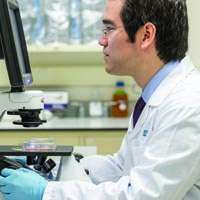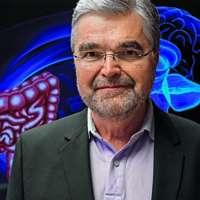Center for Inflammatory Bowel Disease
The UCLA Inflammatory Bowel Disease Research Center, established in 2007, focuses on multiple aspects of the pathophysiology, therapy, and diagnosis of IBD with some of the funding from the National Institutes of Health (NIH), the Broad Foundation, and the Crohn's & Colitis Foundation of America, Inc. Their discoveries are not only helping to unravel the mysteries driving IBD pathogenesis at the molecular and cellular levels, but they are also providing targets for new therapeutic approaches — some of which are currently under investigation.

Research Collaborations
Clinical Research Alliance
UCLA is a member of the Clinical Research Alliance of the Crohn’s and Colitis Foundation of America. The mission of the Clinical Research Alliance is to ask and answer clinically relevant questions that would not otherwise be studied, with the ultimate goal of improving the life of patients with IBD. Learn more
Corrona Inflammatory Bowel Disease Registry
The objective of the Corrona Inflammatory Bowel Diseases (IBD) Registry is to create a national cohort of patients with Crohn's disease (CD), ulcerative colitis (UC) and indeterminate colitis (IC). Data collected will be used to better characterize the natural history of the disease and to extensively evaluate the effectiveness and safety of medications approved for the treatment of IBD. Corrona IBD Registry | Enroll in the Registry

Clinical Trials
Our center conducts cutting-edge biomedical and health-related research studies that include both interventional and observational studies View current list of clinical trials

Jacob Laboratory
Dr. Jacob studies the mechanisms of inflammatory bowel disease (IBD) — in particular, how molecules known as cytokines influence both inflammation and fibrosis in the disease process. Jacob Laboratory

Jacobs Laboratory
Our work in the microbiome realm includes a group headed by Dr. Jonathan P. Jacobs that is investigating how the intestinal microbiome contributes to IBD development. Jacobs Laboratory

Koon Laboratory
Dr. Koon is a basic science research faculty of UCLA Center for Inflammatory Bowel Diseases. He leads a research team to discover novel diagnostic biomarkers for indicating IBD disease activity and risk of intestinal strictures. His team also finds new targets in IBD, C. difficile infection, obesity, diabetes and colon cancer for developing new therapies. His laboratory has a biobank of clinical samples and data, a collection of animal models with various diseases, and diseased primary cell, organoid and fresh tissue platforms for research. Dr. Koon’s laboratory is also a center for multidisciplinary research training and collaborations. Koon Laboratory

Limketkai Laboratory
The Limketkai Lab is a clinical/translational research laboratory whose mission is the generation, experimentation, and application of knowledge that can help shape and improve future care of our patients. Our key research themes -- individually and in combination -- include the domains of inflammatory bowel diseases (IBD), nutrition and biomedical innovation. Limketkai Laboratory

G. Oppenheimer Center for Neurobiology of Stress and Resilience
Dr. Emeran A. Mayer and his colleagues are conducting pioneering studies exploring the interactions between IBD and the nervous system, amid mounting interest in the role of brain alterations in IBD pathogenesis. G. Oppenheimer Center for Neurobiology of Stress and Resilience